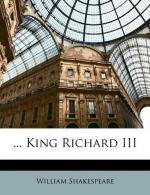|
This section contains 766 words (approx. 3 pages at 300 words per page) |

|
Dreams and Curses
Summary: Describes how Shakespeare uses forshadowing to create suspense and irony in the play Richard III. Also explores Shakespeare's use of dreams and curses in the play. Provides examples from the text.
Forshadowing often creates suspense and irony when used correctly. In the play Richard III by William Shakespeare, Shakespeare uses many devices to foreshadow upcoming events for his characters. Two devices that Shakespeare uses are dreams and curses.
A device used in Richard III to show foreshadowing is dreams. One dream that occurred during the play was dreamt by Stanley. Stanley dreamed that "the boar had rased off his helm," (III.ii.11), Meaning that Richard, referred to as a boar, is going to cut off someone's head. This dream creates a lot of suspense because it leaves the reader to wonder who's head is going to be cut off and when. Another person who has a dream in the play is Richard. Near the end of the play, Richard has a dream, which is more like a nightmare, where he is visited by the ghosts of prince, Edward, Henry...
|
This section contains 766 words (approx. 3 pages at 300 words per page) |

|


